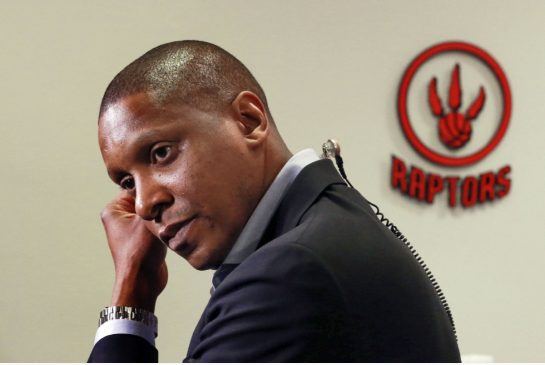The offseason is off to a good start for the Raptors. The front office closely guarded their cap room and future flexibility at the trade deadline and has so far put it to good use, signing Demarre Carroll and pursuing Wes Matthews, who ultimately appears to have chosen Dallas over the Raptors (and the bags of money thrown at him by the disastrous Sacramento Kings). The Raptors being considered a real destination in free agency with their signing of Carroll, discussions with Matthews and their meeting with LeMarcus Aldridge is emblematic of this summer’s new free agent trend of good players seemingly more interested in going to locations with solid foundations where they are a good basketball fit, instead of considering market size, location or glamour. The Los Angeles Lakers and New York Knicks have swung and missed on everyone they’ve sought after with their considerable cap space. This kind of trend simply hasn’t happened before in the NBA. Players are flocking to a combination of long-term security, the best basketball situation and the most possible money.
Toronto has always had an impossible time getting free agents because it’s a cold weather city, outside the USA and off of the mainstream radar (and TNT/ESPN broadcast schedule). The policy had long since been for Toronto to overpay free agents, or even their own players, as the only way to tempt them to come/stay north. But all that seems to have suddenly changed, with teams like Toronto and Milwaukee being genuine free agency players because of their recent success, solid foundations, positions in the Eastern conference and the pitches of their smart management teams. The Raptors entire pitch is no longer an offer to overpay. The irony is, even with cap space, the thing holding the Raptors back this and next year, all things considered, might be their inability to overpay.
The Wesley Matthews case is a good example. Matthews is reported to have been offered an annual salary of $16 million over four years from the Sacramento Kings of Comedy. He turned that down for a $13 million annual deal from Dallas over four years. It’s just a good business decision to hitch your wagon to Mark Cuban and the Dallas Mavericks instead of the dumpster fire of a franchise in Sacramento. But it’s an incredibly bad business decision to leave an astounding $12 million dollars on the table! The thing is, the two offers probably end up being for essentially the exact same amount of money. California has one of the highest state income tax rates in the US, while Texas has no state income tax. So despite the variance in salary, it very well may be that Matthews takes home the same amount of money at the end of the day. Trust me, this would have been made very clear in Dallas’ pitch to Matthews. There is also no state income tax in Florida, and the Miami Heat have been bringing a finance expert to all of their major free agent pitches for years to explain to players how they’d make a little bit more, even by taking a little bit less, to come and play in Florida. It goes a long way towards helping to build a super team, and it was an instrumental factor in Riley and the Heat’s pitch to Lebron 5 years ago. This ties back in to the Raptors because players coming to play in Toronto are bound to pay income tax to both the Canadian government as workers here and income tax back home as well. It’s the inverse scenario of Texas and Florida. If Matthews is offered $13 million by Dallas, Toronto has to offer well in excess of that amount just to offer him the same amount. In a salary capped league, that’s very difficult to do.
$15 million is a lot of money to pay Demarre Carroll, but there are several teams who in all likelihood would have offered him that same money, especially in light of the salary cap set to explode over the next few years. The Raptors actually got lucky then, that they paid market value for Carroll instead of a premium. It’s also why their pursuit of LeMarcus Aldridge was probably always a mirage. Multiple teams will offer Aldridge max money, and even if the Raptors did that, our max money is ultimately less annual money than what the other teams are offering. The whole reason that the salary cap exists is to create parity and make it so that small market teams aren’t disadvantaged competing against big names like New York, Chicago, Los Angeles and Miami. It clearly isn’t doing that in this case and is, in fact, making it a tough uphill fight for the Raptors because of their international location. It only seems fair that the league should consider some sort of flexible cap exception for the Raptors allowing them a small amount of extra cap space to compensate for the amount of money it’s players will immediately lose in tax dollars to the Canadian government. It would only be fair, but unfortunately, I can’t see this happening, and I definitely don’t see this happening before the next CBA.
The Raptors have often had to search off the beaten path for free agents, looking for the diamonds in the rough, overseas talent and smaller names. That they are now in the mix for bigger names is exciting, and the result of everything smart on and off the court that team management has done over the last few years. But being in the mix for bigger names means you’re bidding against competitors, and the Raptors are going to have to learn how to make one hell of a pitch, because cap space being equal, they are never going to be able to outbid anyone.



